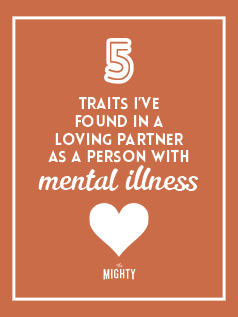You know they are out there. Those people who aren’t going to be helpful to you when you’re dealing with your mental illness. They do exist, and you need to be mindful of that.
• What is Bipolar disorder?
I have dated a few men prior to marrying my now husband, and I learned over time different things I needed for my bipolar disorder in order to have the best, most supportive relationship possible. I didn’t even know I needed some of these things before I got married, but I think they truly help me combat my bipolar disorder. I wanted to share a few traits I think are important for your significant other to have in order to help you the most with your mental illness. They are good traits for anyone to have, as well, and they go both ways. Yet, I think it is helpful for people with mental illnesses to find a significant other with some or all of these traits.
1. They should have an ability to listen.
This is a big one. If you are with a partner who doesn’t listen to you or try to understand what you are going through, it’s not a great sign. When I found my now husband, he would listen to what I had to say about how I was feeling. Now, no one is perfect, and many people want to be able to “fix” things. It took some time for my husband to realize he couldn’t necessarily “fix” me, and he had to be OK with simply helping me. Yet, after some couples’ counseling (while dating and married) and lots of long talks, we came to a mutual understanding that he didn’t always have to offer solutions. He could just listen and love me. This is important because oftentimes it helps to just be heard, even if there isn’t a solution.
2. They should have patience.
Having patience is critical, and I think this is the trait that is absolutely necessary in the person you are dating. They should be patient at all times: on the days when it isn’t getting better, when it’s getting worse, when you can’t get out of bed or when you’ve started 10 million projects over night. You need a partner who is patient enough to see you need help getting out of your mindset of mania or depression and that it might not happen quickly. You need someone who is willing to walk beside you, no matter how long it takes.
3. They need a willingness to learn and accept.
If your partner is willing to learn about your condition and if they are hungry for information on how to help and understand you, then this is fantastic. If they are open-minded toward what you are going through, then it will make it that much easier for them to help you in the long run. Your partner needs to accept you just as you are, good days and bad. If your partner stays with you only in hopes that you will eventually be “cured,” then this is not someone you want to be with. You may never fully come out of the episodes. You need to be with someone who guides you through them, instead of waiting for them to end. It is important that the person you are with not only wants to learn more about your illness as a whole, but also how to best help you battle it. Every person living with a mental illness has different ways that help them cope and heal. You should be with someone who can help you find it and learn about you along the way.
4. They should be honest.
This may seem obvious, but I find honesty (with a touch of being gentle) to be one of the most helpful things my husband brings to the table. He is able to gently question me when I’m in a bad place. He will tell me in a nice way (and we’ve worked on this) when he thinks I am starting to go into mania and that I’m taking on too much. At the same time, it is a delicate balancing act with the “listening” part. You can’t always think rationally. So sometimes honesty isn’t taken well. I do still think it is important that your partner doesn’t always cater to all of your ideas during mania or depression. Sometimes, that only fuels the fire. It is helpful to have my husband ask me directly, “Have you taken your medicine?” and things like that.
5. They should have love and devotion.
“I’m not leaving, no matter how hard it gets.” This is something you save for the person you decide to spend the rest of your life with. Yet, it is a trait you want to identify long before you get to the altar. Everyone says this, “through thick and thin,” but for people with mental illnesses, the thick can be much thicker and the thin can be much thinner than for other people. Having someone by your side, who will never leave you no matter how bad the days get, is a source of strength and stability as you fight through the hard days. It is challenging enough to battle your own brain without having to wonder if your partner will love you through it or if they will bail. My husband always tells me all the good days are worth getting through the days when I am not myself. He is my anchor. I owe him much of my recovery.
Dating or being in a relationship is challenging, even without a mental illness involved. Unfortunately, you may have to go through a few bad dates and relationships before you find someone worth sticking with. Once you find them, you’ll know. These traits are things to look for initially (although you can work on them once you’re in the relationship if the person is willing to learn). I’ve found them essential to keeping my marriage working while dealing with mental illness.
To all those battling a mental illness, I wish you love and happiness. Don’t settle for someone who isn’t willing to learn, understand and listen. Stay with someone who is willing to stick by you. Above all, find someone who loves and cherishes you exactly the way you are, mental illness and all.
Image via Thinkstock.


